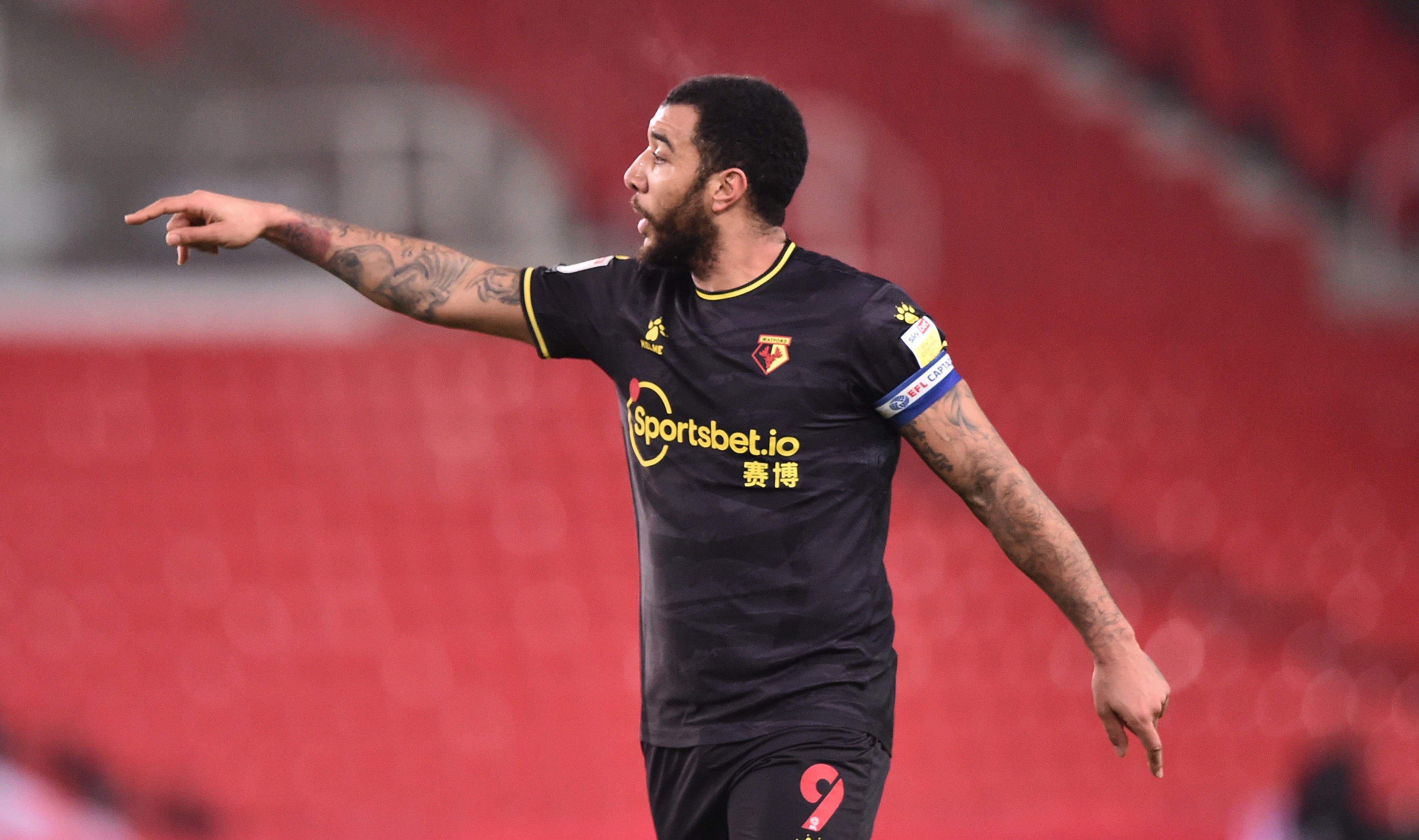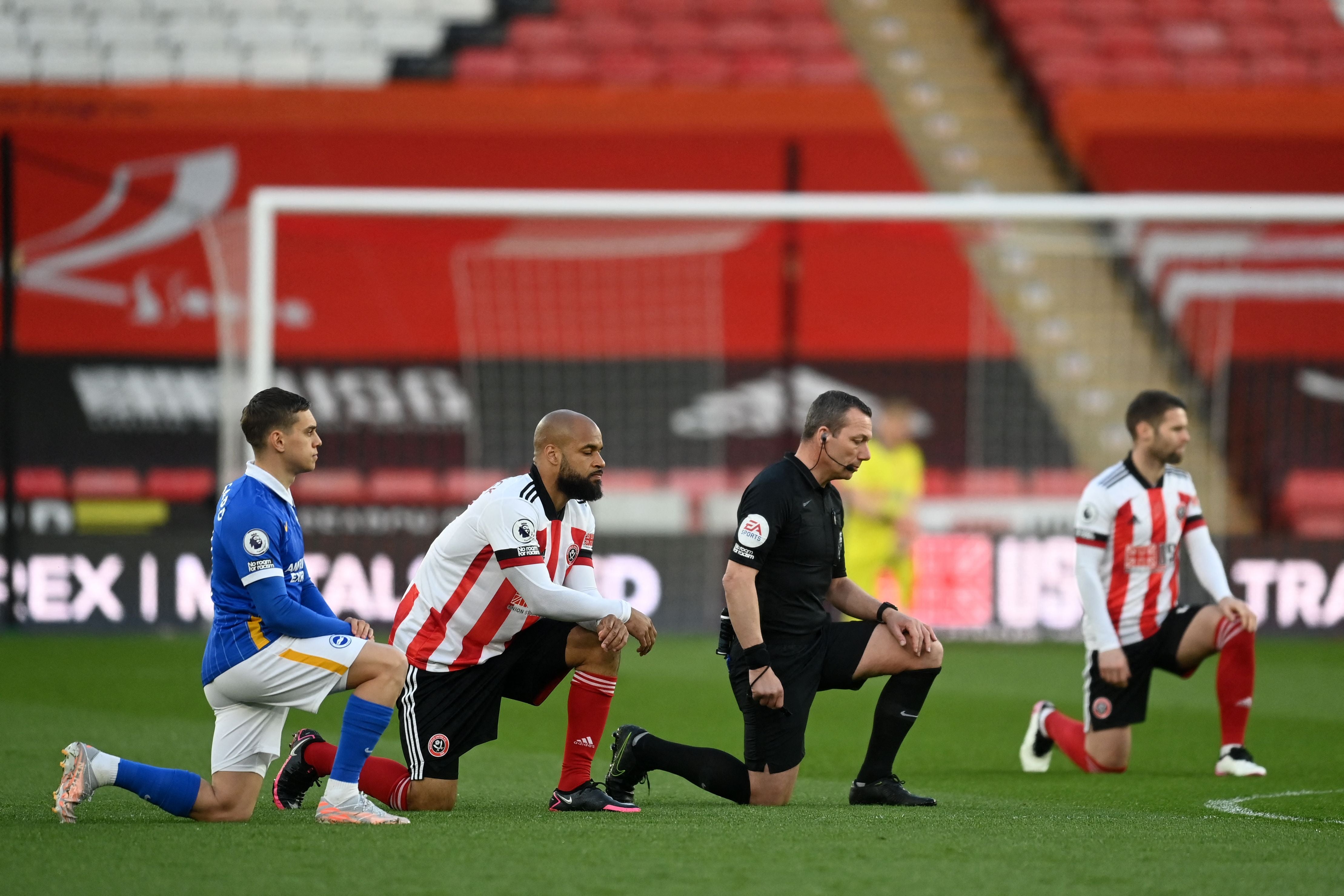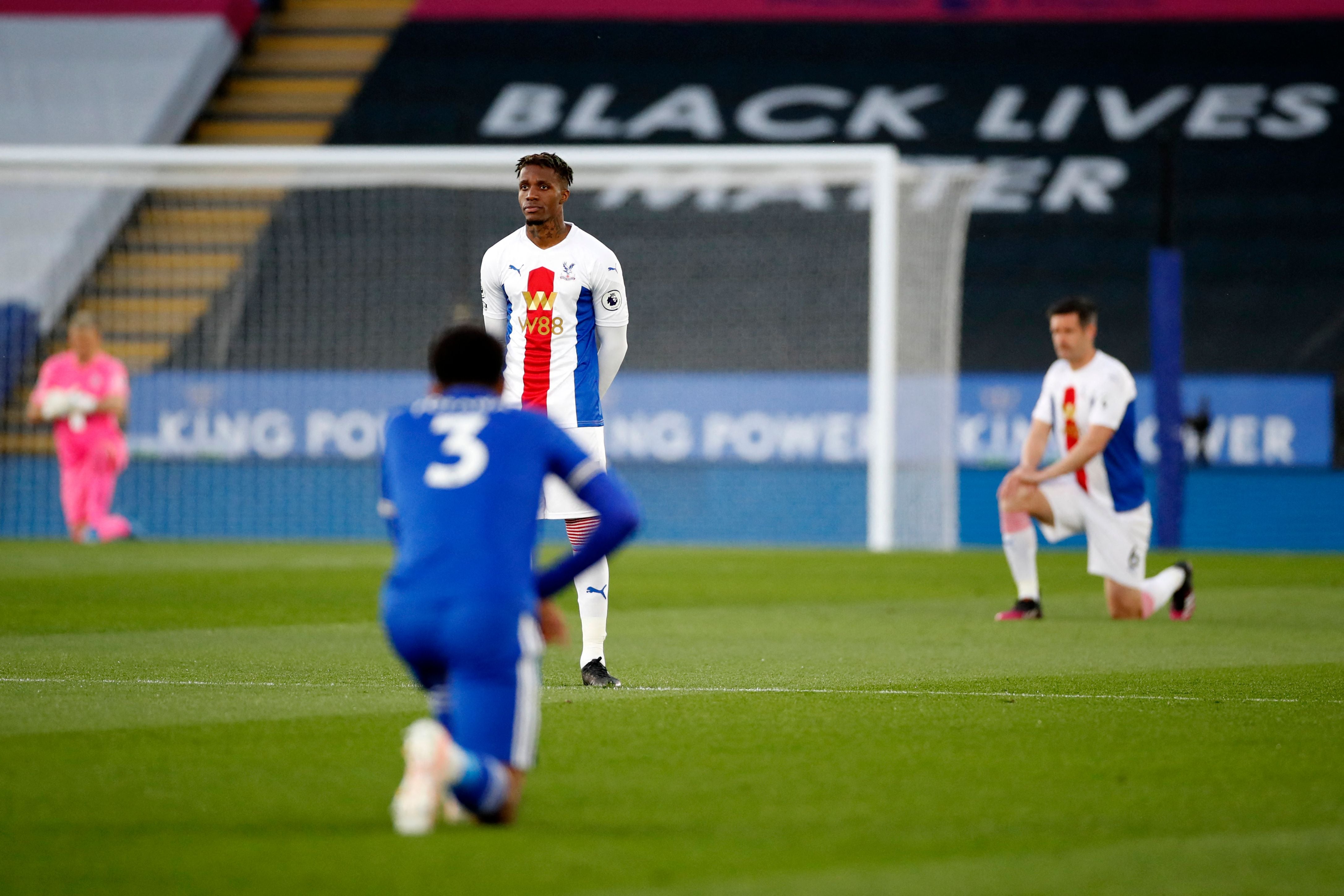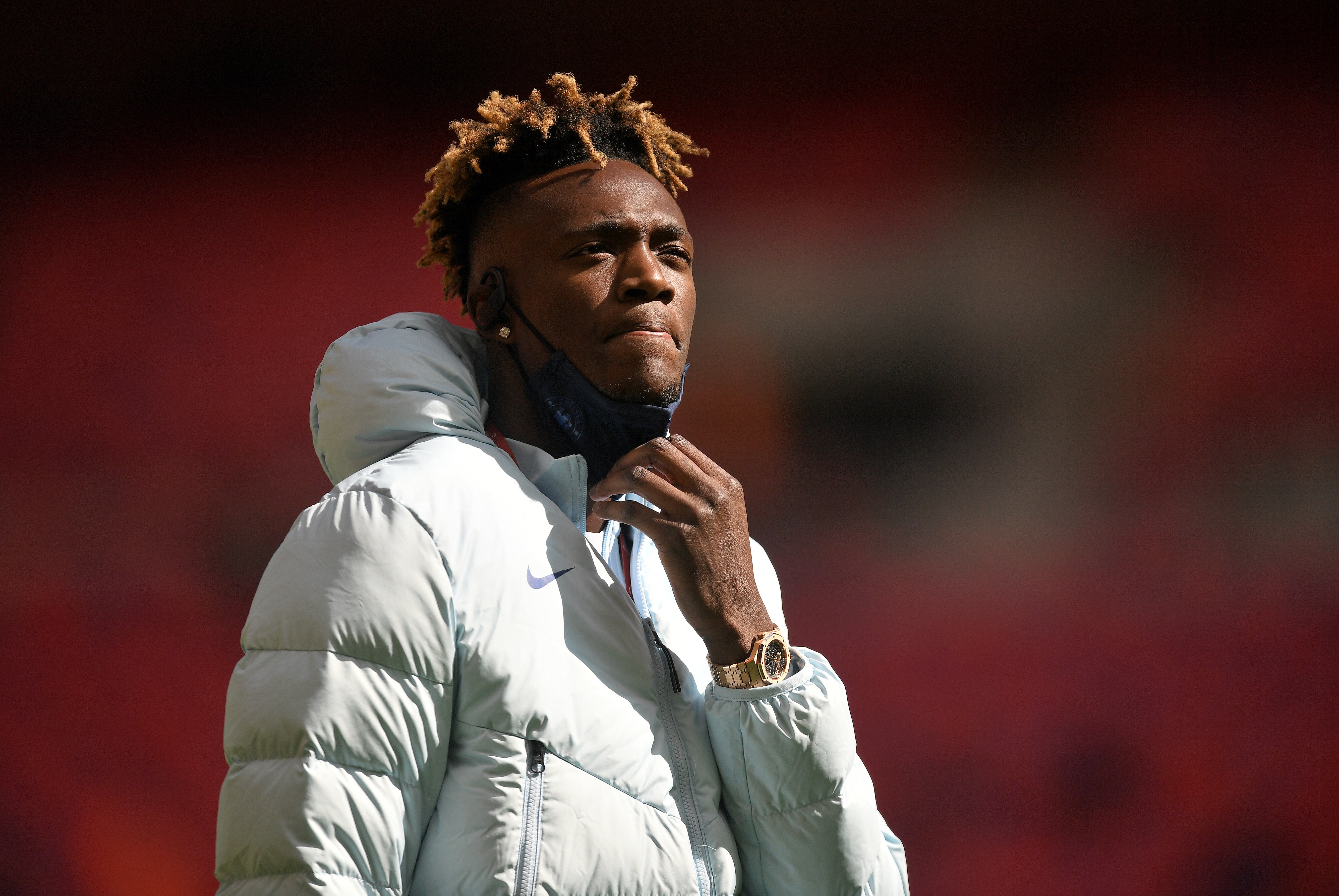A season of taking the knee
After a full season of the anti-racism gesture, Vithushan Ehantharajah spoke to Kick It Out chief Tony Burnett and a number of fans about what it now means


Your support helps us to tell the story
From reproductive rights to climate change to Big Tech, The Independent is on the ground when the story is developing. Whether it's investigating the financials of Elon Musk's pro-Trump PAC or producing our latest documentary, 'The A Word', which shines a light on the American women fighting for reproductive rights, we know how important it is to parse out the facts from the messaging.
At such a critical moment in US history, we need reporters on the ground. Your donation allows us to keep sending journalists to speak to both sides of the story.
The Independent is trusted by Americans across the entire political spectrum. And unlike many other quality news outlets, we choose not to lock Americans out of our reporting and analysis with paywalls. We believe quality journalism should be available to everyone, paid for by those who can afford it.
Your support makes all the difference.The football season has come to an end. Club champions have been crowned and the international schedule is preparing to carry the baton into the summer.
While the game has coped with Covid-19 it has also dealt with its own reckoning around race and discrimination. It has been a divisive issue, one given a shot in the arm after fans returned to grounds at the back end of the 2020/21 season.
With every Premier League team hosting a match before the campaign’s conclusion, the sound of boos greeting players taking the knee prior to kick-off before applause came through to drown out the dissenters was a reminder of the work that still needs to be done.
Taking the knee before the referee’s whistle was brought in as a gesture of solidarity during Project Restart following the death of George Floyd and Atlantic crossover of the Black Lives Matter movement. It drew introspection from the United Kingdom and its own relationship with race and discrimination. As revealed in an interview with The I, the gesture was pushed through by Watford’s Troy Deeney and was backed unanimously by other Premier League captains during the 2019/20 season.
The following is an interview with Kick It Out chief executive Tony Burnett. Appointed in the role in February of this year, Burnett has a long history on matters pertaining to race and inclusivity.
As assistant director of diversity and inclusion at West Midlands Police, he worked on getting more Black and Asian officers in the force. He also examined external agendas, such as why minorities are disproportionately targeted when it comes to Stop and Search and use of force.
He has also worked on similar schemes in the financial sector with the Lloyds Banking Group and consulted in South Africa where he investigated the effects of internalised oppression.
As part of this interview with Burnett, The Independent spoke to a number of fans across a variety of teams over their thoughts on players taking the knee and the active drive to tackle discrimination.

For clarity, the text in italics come from The Independent’s findings. While they informed questions to Burnett, they were not directly relayed to him.
What have you made of players taking the knee and its significance over the last year?
I think as a gesture of anti-discrimination, it has worked. It’s certainly kept the issue on the radar with football authorities. We’ve seen the football leadership diversity code, we’ve seen more action around No Room For Racism and that campaign from the Premier League. I don’t think those things would have happened if the players hadn’t taken a visible stand.
The fact they do continue to take a visible stand, the key thing it does for me is keep it on the agenda. They’ve got the power to do that – more power than any other group. The Premier League, the FA, the PFA can’t afford to ignore the senior players. So whatever gesture – and they chose taking the knee – I absolutely support it. Anything that keeps it on the radar for the powers of football, it needs to be done.
On the subject of visibility, it does seem football’s part in the discussions around race and discrimination has been very pronounced in the broader conversations that have taken place in this country since the death of George Floyd.

Well, that’s because there is a broader issue around society. The number of times I’ve been asked about taking the knee in the last four or five months… and that’s not to have a go at you.
The problem with the question for me is that it detracts from the issue. The issue is that players are standing up against discrimination. And we’ve spent more time discussing how they choose to do than the fact it’s discrimination they’ve chosen to stand up against.
If you look at how a lot of the discussions have been framed, it’s a distraction. Let’s talk about the real issue: the discrimination all over football. Rio Ferdinand was the latest victim of it on the last Sunday of the season [Ferdinand was racially abused by a Wolverhampton Wanderers fan at Molineux while he was working for BT Sport]. I would love it if people stopped asking me about taking the knee, but actually focused on what the issue is: systemic and structural racism in Britain. It’s alive and well, it’s been around for centuries, let’s get to the real conversation. Forget statues, forget taking the knee – let’s talk about that.
It does seem bad-faith arguments, a prevalent tactic in political discourse, have infiltrated football. Does that suggest within the game we need to get smarter about how we broach discrimination?
Two fans who spoke to The Independent and felt uncomfortable with players taking the knee both cited similar comments made by a founder of the Black Lives Matter movement in the United States that could not be substantiated. Another, who believed the knee was perpetuating ‘Black supremacy’, pointed to comments attributed to Yusra Khogali – co-founder of the Black Lives Matter movement in Toronto – that could not be substantiated.
One fan brought up the knee as a wider attempt to Trojan horse Marxism into the country. When pressed on their understanding of Marxism, they did not reply.
We spent a lot of time on online harm over the last 12 months, particularly because stadiums have been closed. I would have thought we would have had an issue in and around stadiums had we not had Covid. The reason I say that is because society’s attitudes towards race are becoming ever-increasingly dangerous.
We are seeing a massive increase in far-right activity. It’s the biggest terrorist threat. We are seeing a lot of people who would have been on the political left have moved further right and the issues they are talking about are around immigrants, black people, our fathers and our ancestors. Society’s agenda is moving in the wrong direction on this and I think we really need to get hard when it comes to clamping down on some of this discussion, actually. Football is at the forefront because it’s all over the press and really prominent. But I think football is reflecting society on this issue.
In that regard, do you think the knee has emboldened this discourse? That people are wearing their racism more lightly because of it?
A conversation relayed to The Independent went like this: "In Britain, people don't like to be called racist all the time and that's how this [taking the knee] comes across. Britain is a broadly not racist country and I don't like this implicitly saying 'lots of Britain is racist'."
I don’t think that’s about taking the knee. I think this started when Brexit kicked off. The hatred, polarisation and binary positions people took up from then has carried on. And Brexit became an excuse for racism to resurface in the UK and we are seeing that manifest in football now. I don’t think players taking the knee have caused this, I think people taking the knee are trying to address it.
What’s caused this is government behaviour, government attitudes towards race, failure to tackle racism at a national level and allowing organisations and sports like football to get away with it for years.
The football leadership diversity course is brilliant. But it’s 20 years overdue, let’s be absolutely honest. The fact I can’t tell you what the representation is over the football world for black and asian people says to me that we’ve got a problem. That’s not come about because players have taken the knee.
I spoke to a Crystal Palace fan who went to the Arsenal match on 19 May. He was sat in the Whitehorse Lane End when another fan got up to boo the knee. Those around him began to argue with him. His excuse was that he was supporting Wilfried Zaha [in February, Zaha became the first footballer to openly say he would not be taking the knee because he felt the protest was no longer sufficient].

One of the fascinating things I found from Zaha’s stance is he was clearly saying he was upset that not enough is being done when it comes to talking discrimination.
We talked about “bad-faith” arguments before. Zaha is someone cited as a player who is “against” kneeling. But, as you say, it’s actually the opposite – he wants to see meaningful change. He is perhaps a prime example of how players have been more emboldened to stand-up and talk over the last year. Tyrone Mings is another that springs to mind, but there have been plenty more. And not just black players.
I think it’s a really positive outcome of the last 12 months. But the impact players can have is limited. This isn’t just football on the field, remember.
We’ve all been really clear about the lack of black managers and coaches in the game. It’s still a massive issue: There have been nine black managers since the Premier League formed in 1992 out of 240 appointments. That’s less than five per cent of the total management population when 30 per cent or above of our player population are from black background. We’ve got 10 players from Asian backgrounds in the football league playing professionally. Football’s got its issue as well.
To look outside of football we’ve got not a single black CEO of our top 100 organisations. Not one of the 43 chief constables in Britain is black. Structural racism is alive and all you need to do is look at the stats. Every single organisation in this country faces the same issue.
I don’t know Zaha and I don’t know if he wants to be a manager or not, but if I’m in his shoes or those of any other black or Asian players, they will know – even Zaha as a prominent player – their chances of becoming a manager when he finishes are far less than his white colleagues on the same team. That can’t be right.
I’ve noticed clubs have been trying to do their bit to further the cause. Chelsea is an interesting case study in this given the reputation of their fanbase. During their matches this season they have shown a video on the big screens with former winger Paul Canoville and current striker Tammy Abraham discussing issues around race. They are two generations apart but are speaking of the same troubles.
A representative from We Are The Shed, a fan group that emanated from Chelsea supporters who sit in The Shed End at Stamford Bridge. Two weeks after the death of George Floyd, one of their members posted a disparaging meme in the WhatsApp group about Floyd. It led to the formation of The Shed Inclusion Group to change how football fans – in this case, specifically Chelsea fans – perceive race and gay rights. That in turn has led to their group having more conversations around discrimination, which has been quite forthright.
This representative was at the FA Cup Final when Chelsea fans booed the knee. Ahead of the league fixture in midweek against Leicester City, they sent out the following Tweet.
A spokesperson from Chelsea fan group “We Are The Shed” said that while they are happy to try and educate their own – at times, putting their own safety at risk – more needs to be done by the powers that be. And I suppose the important question is: What kind of education does that need to be?
No doubt football has a role to play in education. It is one of our three points at Kick It Out that we are looking to push.
Why is it that we can go through an entire school system without really understanding the impact our forefathers, black and Asian, have had on the success of this country? Why can we go through this system without really talking about structural racism, slavery and about what slavery creates to keep a group of people oppressed? We don’t talk about the fact slavery built a structure that says one group of people is inferior to another.
Off the back of my work in South Africa, there were very clear findings. For slavery to succeed, it had to create a mindset that said to one group of people “you’re inferior”, and to another group of people “you’re superior”. And that’s why education is so important in schools, because we are still producing white kids who think they are superior and back and asian kids that think they’re inferior. That’s wrong.
Football has a part to play telling its own story. We are seeing again about Chelsea coaches from the ‘90s going on trial [former Chelsea youth team coach Gwyn Williams is being investigated for allegedly using racially offensive terms towards players in the 1990s]. Part of the narrative I’m seeing around that is the context of history: that it was a different time. I lived during the ‘90s and was in football during the ‘80s and ‘90s. I don’t remember there ever being a time when those terms were acceptable.
The next is about fair representation. I don’t know The Independent, but I can probably bet you £100 now that it is not representative at senior levels. I bet you haven’t got a balanced board when it comes to black and Asian faces. Every time you raise this conversation, the response is “well it should be the best person for the job”. Absolutely, so if you believe that, then representation should be fair. But representation is not fair everywhere. So we’re not getting the best people for the job, unless you believe in eugenics and white people are more talented than black or Asian people.
The third is proper social investment in deprived communities. One of the agendas nationally is “let’s talk about poor white kids”, as if it’s a competition on who should get focus and resources. If we tackle social deprivations, we help poor white kids and we help poor black and Asian kids. That’s the conversation – it’s not either or. If we invest more in under-resourced communities, we tackle racism as well. We shouldn’t be playing this divide-and-conquer game with poor white kids. They face different issues, but their issues are just as serious. Let’s not play a game, let’s just invest.

Representation strikes me as the area where football can make the most meaningful change right now. Because, as you say, football’s demographic and the cycle of white managers who get jobs ahead of their minority counterparts is one that can be easily broken.
When I was in policing, the same questions were asked about policing. When I was in the financial services, the same questions were asked about the financial services.
The narrative we need to get across is that this is right across the board. This isn’t an issue we’ve just got to solve in football and everything’s going to be fine. We’ve got to tackle this right across the UK.
There have been 20 Eton-educated Prime Ministers: thirty-six per cent of our prime ministers have been Eton-educated. No one can tell me that that’s meritocracy, that that’s the best person for that job. That’s about schooling and privilege, isn’t it?
Finally – where do we go from here? What needs to happen going forward, into next season?
It’s important that we don’t let what’s happened in the last 12 months just become a moment in time. Like the Brixton Riots – that became a moment in time because the effects of that lasted just a year or two, and it was pretty much forgotten and everything went back to the status quo. Same again with Stephen Lawrence in the ‘90s, and yet we are back here again. This can’t be a movement that just peters out. This is about sustained pressure on all the authorities, football included, to drive real change.
Is it important for players to continue taking the knee into next season?
I’m very keen to see what the players do. If they choose to continue taking the knee, brilliant. But whatever they do choose, I hope they choose a gesture because we can’t let the authorities get away with not addressing the issues.
My fear is, if the players don’t make some form of visible gesture, the authorities will take their foot off the pedal again and we’ll be having the same conversation in 10 years.
The players have to make the decision themselves. And whatever the players decide, I can tell you, Kick It Out will be fighting this very visibly and with as much voice as we possibly can. We are not giving this up because change has got to come.
Join our commenting forum
Join thought-provoking conversations, follow other Independent readers and see their replies
Comments